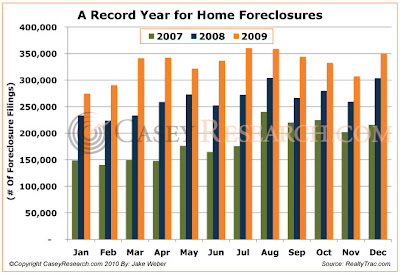The ugly truth behind dollar and euro
Dollar and Euro, which is the less-worse currency?
The dollar and the euro are engaged in an ugly contest.
In a long slide since 2000, the dollar has lost 41% against the euro. After a brief rebound as investors sought safety during the worst of the financial crisis, the greenback again weakened through 2009. But that could change this year.
That might seem odd as, on the face of it, there is little to recommend the dollar. A fed-funds target rate hovering at around zero, quantitative easing and ballooning deficits all serve to undermine the currency. Economic data, especially in consumer-sensitive areas like housing and employment, remain weak.
Ugly as that is, Europe is no model of perfection either. Greece, the obvious blemish, points to a deeper malaise. As Brown Brothers Harriman & Co. says, incomplete political union leaves the euro zone without effective mechanisms to enforce fiscal discipline in member states.
Other countries—like Greece—have lost competitiveness over the past decade but could not devalue, and relied on fiscal expansion instead. If Greece calls for a bail-out, countries like Germany will have to weigh the risks of raising moral hazard versus the risks of destabilizing markets by standing firm—an unpalatably Lehman-like quandary. The need for more rigorous fiscal policing by definition suggests further erosion of member-state sovereignty will be required, setting the stage for protracted political wrangling.
China’s artificially low renminbi may be compounding the euro zone’s problems. Lombard Street Research reckons European businesses bear the brunt in terms of loss of market share in international trade.
China’s recent moves to tighten monetary policy might suggest some relief on this front. But the more pertinent effect, from a currency perspective, is to raise anxieties in financial markets—as observed in recent stock sell-offs and the jump in volatility measures like the VIX index. As the experience of late 2008 showed, if things turn ugly, investors tend to close their eyes and embrace the dollar.
US dollar recently had a strong upward trend, for the first time since June 2009, it’s about to break the 200-day moving average.
Is China’s real estate bubble ready to burst?
Predicting bubble in notoriously difficult, not to mention predicting when the bubble will burst. Nonetheless, I do think China’s real estate bubble will burst eventually. It’s not a matter of whether, but when.
Some insights from investor Chanos.
Stiglitz at Davos
Joseph Stiglitz comments on Obama’s economic policies at Davos, Switzerland.
State of the Union
Obama’s State of the Union Address Wednesday night:
Fed exposed
The risk faced by the Fed. Investment banks are being deleveraged; but the Fed got leveraged up:
The Federal Reserve's blowout 2009 profit is no reason to cheer. Rather, it is a reminder of the dangers inherent in the extraordinary policies the central bank has pursued during the credit crunch.
Last year, the Fed earned $52.1 billion, with most of that income coming from interest-payments on bonds that it bought during the year to shore up the economy and credit markets.
Anyone with access to printing presses could have racked up similar gains. But the Fed's purchases leave it exposed. Its assets are 43 times its capital, compared with 15 times at Goldman Sachs. As a result, its equity could be wiped out by just a 2.8% drop in the value of its Treasurys and securities issued by Fannie Mae and Freddie Mac. True, the Fed could hold on to those securities and ride out any losses, and retain earnings to boost capital, but what self-respecting central bank wants to risk a negative net worth?
Even the fact that the Fed is, as usual, paying most of its profit to the Treasury isn't good news. It means the Treasury is paying almost no interest on a large slug of debt purchased by the Fed. That can only chip away further at fiscal discipline.




![[FEDHERD]](https://sg.wsj.net/public/resources/images/MI-BA800A_FEDHE_NS_20100112170742.gif)